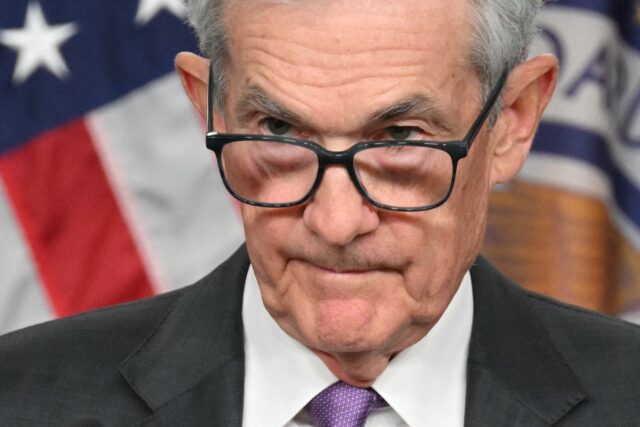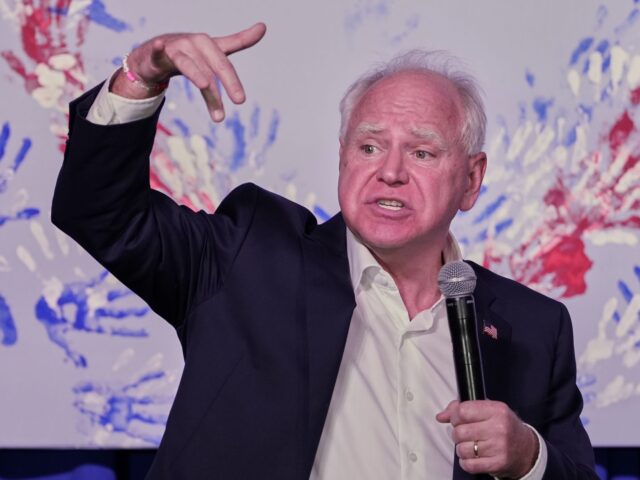from Sky News
Did the Fed Wait Too Long to Act?
America has officially defeated inflation without experiencing a recession—yet.
by Rogé Karma
The Atlantic
 The Federal Reserve has declared victory in the war on inflation. At its meeting today, the central bank announced that, after setting higher interest rates for two years in an effort to tame prices, it is finally beginning to bring them back down.
The Federal Reserve has declared victory in the war on inflation. At its meeting today, the central bank announced that, after setting higher interest rates for two years in an effort to tame prices, it is finally beginning to bring them back down.
The Fed lowered interest rates by 0.50 percent (or 50 basis points), and has suggested that future cuts will be similarly sized. That’s more aggressive than some observers expected, but even at that pace, the super-low rates of pre-pandemic America are still years away. The immediate financial effects will therefore be modest. More important, in all likelihood, is the message that the announcement sends: Inflation is no longer a major concern, and the Fed is now focused on keeping the economy, particularly employment, running strong.
It’s Plan B, Not Plan Stupid
by James Hickman
Schiff Sovereign
 At some point early in 2011, I received a frantic phone call from a woman who was terrified that then-President Obama was going to “close the borders”.
At some point early in 2011, I received a frantic phone call from a woman who was terrified that then-President Obama was going to “close the borders”.
She had apparently been reading some pretty dark forums on the Internet which had convinced her that Obama was going to prevent all US citizens from leaving the country… and she was intent on getting out of the country before that happened.
I spent the first part of our call trying to disabuse her of the rumor. While I acknowledge that anything is possible, I’m also a data-driven person… and there was simply zero credible evidence to suggest that President Obama was going to restrict all traffic into and out of the United States.
But, still, she wouldn’t listen. So I asked her what she wanted to do. She told me that she intended to pick up her entire life and move to Uruguay within the next 48 hours.
Fed Goes Big: Cuts Rates by Half Percentage Point
by John Carney
Breitbart.com
 The Federal Reserve moved to cut interest rates by a half percentage point—the first reduction since the central bank cut rates to near zero when the pandemic struck in 2020—in a vote of confidence that inflation will continue to moderate and an attempt to fend off a further increase in unemployment.
The Federal Reserve moved to cut interest rates by a half percentage point—the first reduction since the central bank cut rates to near zero when the pandemic struck in 2020—in a vote of confidence that inflation will continue to moderate and an attempt to fend off a further increase in unemployment.
“Recent indicators suggest that economic activity has continued to expand at a solid pace. Job gains have slowed, and the unemployment rate has moved up but remains low. Inflation has made further progress toward the Committee’s 2 percent objective but remains somewhat elevated,” the Fed said in a statement.
The Fed’s benchmark rate will now be a range of 4.75 to 5 percent, where it last was in April of 2023.
Fed Rate Cuts: Better Late Than Never
by William J. Luther
The American Institute for Economic Research
 The Federal Reserve’s Federal Open Market Committee (FOMC) announced a 50 basis point cut in its federal funds rate target on Wednesday. The move marks a reversal at the Fed, which had held its target rate range at 5.25 to 5.5 percent since July 2023. FOMC members previously worried high inflation might become entrenched. They now believe inflation is on a path back to 2 percent, thereby warranting a gradual transition from tight to neutral monetary policy.
The Federal Reserve’s Federal Open Market Committee (FOMC) announced a 50 basis point cut in its federal funds rate target on Wednesday. The move marks a reversal at the Fed, which had held its target rate range at 5.25 to 5.5 percent since July 2023. FOMC members previously worried high inflation might become entrenched. They now believe inflation is on a path back to 2 percent, thereby warranting a gradual transition from tight to neutral monetary policy.
At the post-meeting press conference, Fed Chair Jerome Powell described the decision as “a process of recalibrating our policy stance away from where we had it a year ago when inflation was high and unemployment low to a place that’s more appropriate given where we are now and where we expect to be.”
Five Reasons Why Inflation and the Supply Chain is Affecting People Everywhere
by Paul Sanders
Forbes
![]() After decades of living in London, Los Angeles, New York, and Dallas, my wife and I decided to settle down in the Scottish countryside. The “middle of nowhere” is a happening place compared to where we live. On a busy day, we may see a couple of cars (one of which is normally lost tourists looking for where they film “Outlander”), a tractor, and an ATV with a border collie hanging off the back.
After decades of living in London, Los Angeles, New York, and Dallas, my wife and I decided to settle down in the Scottish countryside. The “middle of nowhere” is a happening place compared to where we live. On a busy day, we may see a couple of cars (one of which is normally lost tourists looking for where they film “Outlander”), a tractor, and an ATV with a border collie hanging off the back.
The nearest town – which is five miles away – contains a pub, petrol station, convenience store, and a post office that closes for lunch, half-days on Wednesday, and, really, any other time they feel like it.
The world doesn’t interfere here. And we like it that way… until recently.
Wages, Adjusted for Inflation, Are Falling for New Hires in Sign of Slowing Job Market
by Paul Davidson
USA Today
 If you need further proof that the nation’s formerly sizzling job market has gone cold, look to what had been perhaps the hottest part of the post-pandemic hiring frenzy: pay for newly hired workers.
If you need further proof that the nation’s formerly sizzling job market has gone cold, look to what had been perhaps the hottest part of the post-pandemic hiring frenzy: pay for newly hired workers.
After adjusting for inflation, average wages for new hires fell 1.5% over the 12 months ending in July – from $23.85 an hour to $23.51– the largest such decline in a decade, according to an analysis of Labor Department figures by the W.E. Upjohn Institute for Employment Research.
By contrast, inflation-adjusted earnings for typical workers staying in their jobs rose 2.3% during the same period, the Upjohn Institute study shows.
When the economy is accelerating, pay increases for new hires tend to outstrip those of existing employees as companies rapidly add positions and compete for a limited pool of job candidates, says Brad Hershbein, a senior economist at the Upjohn Institute.
Trump’s Tariffs Would Be Worse Than Biden’s Inflation
by Rick Newman
Yahoo! Finance
Anybody stinging from the sticker shock of inflation during Joe Biden’s presidency should be alarmed at what might be coming if Donald Trump becomes the next president: tariffs on imports that could be even more painful.
Trump wants to impose new tariffs of 20% on most imports, with a 60% tariff on products from China. That’s on top of more modest tariffs Trump already imposed during his presidency. Americans buy $3.8 billion worth of imports every year, more than any other nation. That’s nearly as much as Americans spend on healthcare, and you’ll never hear a presidential candidate promising to raise healthcare costs by adding new taxes.
An Unprecedented Monetary Destruction is Coming
by Daniel Lacalle
Mises.org
 Global money supply has soared by $20.6 trillion since 2019, according to Bloomberg.
Global money supply has soared by $20.6 trillion since 2019, according to Bloomberg.
Additionally, global debt surged by over $15 trillion in 2023, reaching a new record high of $313 trillion. Around 55% of this rise came from developed economies, mainly the U.S., France, and Germany. Unfunded liabilities in the United States amount to $72 trillion, almost 300% of GDP. This may seem high until you look at Spain with 500% of GDP, France with close to 400%, or Germany with close to 350% of GDP.
There is no escape from debt. Paying for the government’s fictitious promises in paper money will result in a constantly depreciating currency, thereby impoverishing those who earn a wage or have savings. Inflation is the hidden tax, and it is very convenient for governments because they always blame shops or businesses and present themselves as the solution by printing even more currency.
Tim Walz Stumped By Question On Inflation; Repeats Lie About Trump ‘Sales Tax’
by Joel B. Pollak
Breitbart.com
 Minnesota Gov. Tim Walz, the Democratic nominee for vice president, was stumped Tuesday when asked by a reporter to explain what he and Vice President Kamala Harris would do for families struggling financially.
Minnesota Gov. Tim Walz, the Democratic nominee for vice president, was stumped Tuesday when asked by a reporter to explain what he and Vice President Kamala Harris would do for families struggling financially.
In an interview with local Macon, Georgia, CBS affiliate WMAZ, Walz first said that he and Harris understood the problem because they are “middle class.”
[…] He then offered a series of her proposals unrelated to inflation:
I tell them Kamala Harris and I know something about it being middle-class folks. Our family sit at the table trying to pay the bill. We know coming out of the COVID pandemic with prices where they were, that people need to see some relief.
And I think that’s why Kamala Harris has put out a plan — especially around home ownership — making sure we’re building 3 million more affordable homes, making sure we’re making the down payment assistance there.
‘The Worst Outcome’ – JPMorgan CEO Issues Stark U.S. Dollar Fed Inflation Warning as the Bitcoin Price Suddenly Crashes Under $60,000
by Billy Bambrough
Forbes
![]() Bitcoin has dived over the last 24 hours, with the price crashing under $60,000 per bitcoin as the market braces for an “inevitable” bitcoin price crash.
Bitcoin has dived over the last 24 hours, with the price crashing under $60,000 per bitcoin as the market braces for an “inevitable” bitcoin price crash.
The bitcoin price has swung between highs of $65,000 and lows of almost $50,000 over the last month, with the world’s largest asset manager BlackRock issuing a serious volatility warning.
Now, as Tesla billionaire Elon Musk stokes fears of a U.S. dollar “total collapse,” the chief executive of Wall Street giant JPMorgan, Jamie Dimon, has warned the Federal Reserve and the U.S. dollar aren’t “out of the woods” yet.
